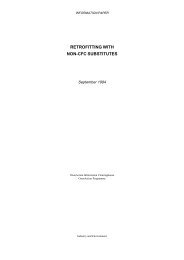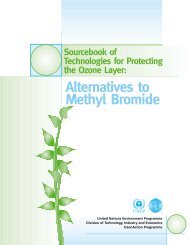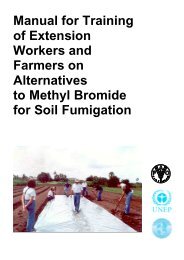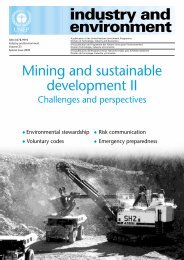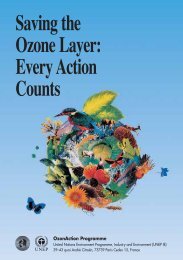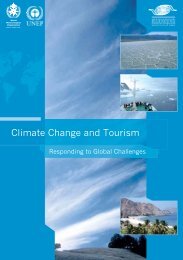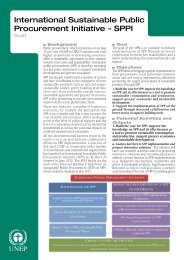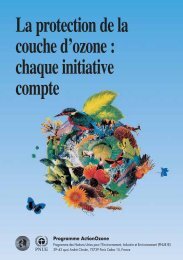industry and environment - DTIE
industry and environment - DTIE
industry and environment - DTIE
You also want an ePaper? Increase the reach of your titles
YUMPU automatically turns print PDFs into web optimized ePapers that Google loves.
Chemicals management<br />
<strong>and</strong> cleaning of the plastic, results in direct damage<br />
to human skin. Most of the migrant workers<br />
who cook circuit boards suffer from headaches<br />
<strong>and</strong> vertigo. Moreover, there are many cases of<br />
bladder stones, chronic gastritis, <strong>and</strong> gastric <strong>and</strong><br />
duodenal ulcers that need further investigation<br />
with respect to links with the health effects of e-<br />
waste.<br />
The discovery of widespread informal recycling<br />
activities raises fears that China’s electronic waste<br />
smuggling problem extends far beyond Guiyu. In<br />
the latest findings released by BAN <strong>and</strong> Greenpeace<br />
in April 2004, electronic waste was mixed<br />
into steel <strong>and</strong> copper scrap being unloaded 24<br />
hours a day in the port of Taizhou, Jiejiang<br />
Province, from vessels arriving from Korea <strong>and</strong><br />
Japan. Hundreds <strong>and</strong> perhaps thous<strong>and</strong>s of farmers<br />
are now engaged in primitive <strong>and</strong> highly polluting<br />
electronic waste recycling operations,<br />
which involve open cooking of circuit boards,<br />
shredding, <strong>and</strong> primitive smelting. These smallscale<br />
operators are very easy to locate due to the<br />
acrid smell of melting solder. Farmers claim they<br />
will starve if they are only able to farm. They desperately<br />
cling to additional income from circuit<br />
board cooking, melting <strong>and</strong> chip-pulling.<br />
Guiyu <strong>and</strong> Taizhou, the largest <strong>and</strong> most concentrated<br />
sites of electronic waste trade in China,<br />
are faced with <strong>environment</strong>al pollution, health<br />
hazards, unfair trade, <strong>and</strong> other related problems.<br />
The hidden, interrelated issues of <strong>environment</strong>al<br />
<strong>and</strong> social justice (including labour rights, unfair<br />
trade <strong>and</strong> corporate liability) need to be<br />
addressed. Links between electronic waste in<br />
Guiyu <strong>and</strong> the US <strong>and</strong> Japan involve not only a<br />
general <strong>environment</strong>al issue, but also global trade<br />
issues including trade ethics.<br />
The way forward<br />
Regarding hazardous waste, much needs to<br />
change on the international scene. Authorities<br />
give too little attention to reducing/eliminating<br />
hazardous waste at source.<br />
The Basel Ban was justified by the Parties to the<br />
Basel Convention on the basis that transboundary<br />
movements of hazardous waste from OECD<br />
to non-OECD countries were unlikely to constitute<br />
<strong>environment</strong>ally sound management of hazardous<br />
waste, as required by the Convention. This<br />
conclusion was based not only on the obvious lack<br />
of technical capacity in developing countries, but<br />
also (more importantly) on the fact that exporting<br />
pollution to avoid higher costs always works<br />
against the primary goals of the Basel Convention.<br />
These goals are:<br />
1. minimization of hazardous waste generation;<br />
2. national self-sufficiency in hazardous waste<br />
management;<br />
3. minimization of transboundary movements of<br />
hazardous waste.<br />
Although these primary goals were supported<br />
<strong>and</strong> furthered by the hazardous waste trade ban<br />
(Basil Ban) <strong>and</strong> the 1993 global ban on ocean<br />
Interview with a worker in a<br />
shipbreaking yard,Bangladesh<br />
As an agrarian society, Bangladesh is not used<br />
to hazardous work like the breaking of ships.<br />
Our country <strong>and</strong> the people are not ready to<br />
deal with the hazards. The only work hazard<br />
our country has always had is that you might<br />
cut your finger if you were digging the field.<br />
Workers at the shipbreaking yards think it is<br />
common that if you cut a ship it might blast<br />
<strong>and</strong> you die. Sometimes now we observe that<br />
if a ship is gas free, it is safer to cut the ship.<br />
However, it regularly happens that blasts take<br />
place <strong>and</strong> that bodies are thrown from the<br />
ships <strong>and</strong> people lose their legs or h<strong>and</strong>s. We<br />
do not know how many people die from<br />
blasts in the shipbreaking yards. It is heard<br />
that almost every day a labourer dies. It is natural;<br />
it belongs to the job. It is not new that a<br />
labourer dies. The workers have adapted it as<br />
their normal lifestyle.<br />
Dismantling imported e-waste<br />
dumping of low-level radioactive waste, much<br />
more can <strong>and</strong> needs to be done to reduce/eliminate<br />
the generation of hazardous materials <strong>and</strong><br />
products. Clear targets <strong>and</strong> timetables, <strong>and</strong> producer<br />
responsibility, are essential.<br />
Far more resources <strong>and</strong> efforts will be required.<br />
However, hazardous waste recycling is part of the<br />
problem when substitute materials or technologies<br />
exist that could avoid hazardous waste generation<br />
in the first place. Hazardous waste recycling<br />
can indeed be a serious problem, in that it creates/<br />
exp<strong>and</strong>s market dem<strong>and</strong> for continuing hazardous<br />
waste generation.<br />
The United States, the world’s largest hazardous<br />
waste generator, could reduce its hazardous<br />
waste generation by over 41% over less<br />
than five years through substitution without negative<br />
macro-economic implications. 9 Yet if there<br />
is no “driving force” such as m<strong>and</strong>atory substitution,<br />
hazardous waste generation will continue to<br />
increase over time.<br />
The solution to traditional problems of hazardous<br />
waste is clear <strong>and</strong> available, but politics<br />
<strong>and</strong> short-term special <strong>industry</strong> interests obstruct<br />
countries’ efforts. The developed countries with<br />
the greatest capacity need to lead the way by<br />
reducing their ever-increasing hazardous waste<br />
generation through m<strong>and</strong>atory substitution.<br />
This is especially necessary now if we are to<br />
achieve sustainable development, production <strong>and</strong><br />
consumption patterns as new issues continue to<br />
emerge.<br />
Notes<br />
1. There were 118 signatory countries. The Basel<br />
Convention Secretariat site is www.basel.int.<br />
2. Most OECD members are also EU Member<br />
States <strong>and</strong> are therefore subject to EU regulations.<br />
For OECD activities in the area of hazardous<br />
waste management, see www.oecd.org.<br />
3. For the Basel Ban, see www.ban.org.<br />
4. See www.imo.org/<strong>environment</strong>/mainframe.<br />
asp?topic_idi818.<br />
5. See www.basel.int/ships/index.html.<br />
6. Greenpeace has found that most end-of-life<br />
vessels fly “flags of convenience” provided by such<br />
countries when they make their final voyage to<br />
shipbreaking yards.<br />
7. Million light displacement tonnage per year.<br />
8. Prepared by the Basel Action Network (BAN)<br />
<strong>and</strong> the Silicon Valley Toxics Coalition (SVTC),<br />
with contributions by Toxics Link India, SCOPE<br />
(Pakistan) <strong>and</strong> Greenpeace China, February<br />
2002. The entire report can be downloaded at<br />
www.svtc. org/cleancc/pubs/technotrash.pdf.<br />
9. United States Congressional Office of Technology<br />
Assessment (OTA), report on waste management,<br />
1987.<br />
◆<br />
UNEP Industry <strong>and</strong> Environment April – September 2004 ◆ 61



